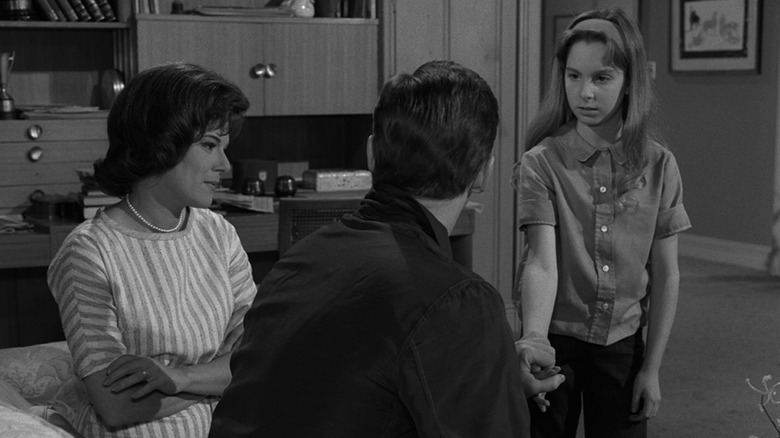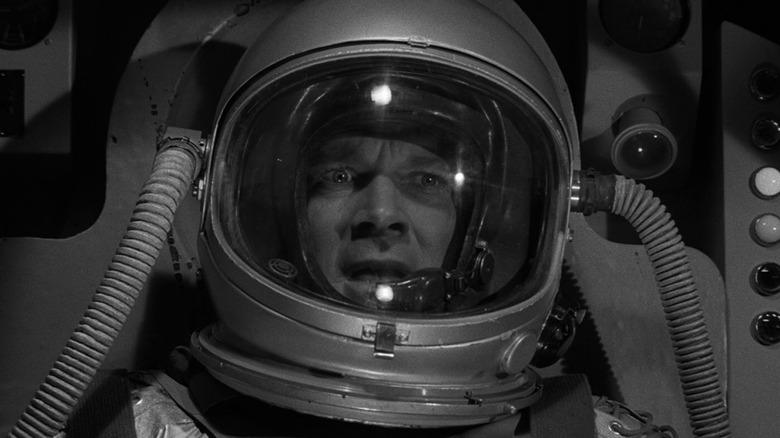Why The Twilight Zone Season 4 Had Hour-Long Episodes
One of the surest signs that a show's best days are behind it is when the studio starts messing with its time slots. Such was the case with "The Twilight Zone," which ran its first three seasons at a pretty consistent pace before suddenly changing things up in season 4. Because creator Rod Serling and the rest of the production failed to find a sponsor for the season in time — which was a standard practice in the early '60s for any big TV show — CBS put it on hold throughout the fall on 1962. When the series returned in spring 1963, it now aired later in the night and was doubled to an hour-long format.
Although Rod Serling would later remark that he'd been unhappy with this decision, that the hour-long slot interrupted the flow of the show's storytelling and led to duller, stretched-out episodes, before the season aired he pretended like he was thrilled about the choice. When asked if he was upset about the change in a September 1962 interview with the Tulsa Daily World, he responded, "Not really. It would have been the fourth year and I think we had about exhausted ourselves in the half-hour format. In the words of the great American pastime, I think we batted about .300 on 'Twilight Zone.'"
But even though Serling was conveying confidence to put viewers at ease, even in that September '62 interview you could see the signs that he knew season 4 wouldn't be up to snuff. At the time it wasn't clear if "The Twilight Zone" would return in the spring (which would be the case if the replacement show "Fair Exchange" crashed and burned) or if they'd return in the fall. "If we jumped in in January I'd feel like a relief pitcher," he said, "and I'd rather start for the team." Unfortunately for him, "Fair Exchange" did crash and burn, so "The Twilight Zone" was back sooner than he'd hoped.
The hour-long Twilight Zone episodes didn't last long
Season 4 of "The Twilight Zone" is widely considered a failure. There were a few great episodes, like "Miniature" or "The Parallel," but for the most part the episodes were seen as lacking the sort of excitement and spark the previous seasons had. "A good show for us is a dramatic vignette with a punch ending, and that's almost impossible at the hour length," Serling told reporters afterward. "I didn't approve of 60 minutes in the first place and we had quite a job turning out the hours. The show has a loyal, hardcore audience and I know they preferred the half-hour version."
Although season 5 thankfully returned to the half-hour format, and gave us a few final banger episodes before it went, the spark of those first three seasons still wasn't quite there. The problem of season 4 wasn't just the longer runtime, but the fact that Serling and the other writers were straight-up running out of creative juice. Serling himself was busy teaching classes at Antioch College and writing for other projects. Combine that with the sheer length of "Twilight Zone" seasons, most of them reaching over thirty episodes, and it would've been no surprise if the show's creator was struggling with burnout.
"In a strange way, I don't really blame the network," he said to reporters after the show's cancellation was announced. "We've been on five years and I think the show took on kind of an aged look."
Even before "The Twilight Zone" was canceled, in a February 1964 interview, Serling seemed to be at peace with the possibility of the show not being renewed. "The series has been good to me," he said. "It's made me a public personality and I like that very much."

